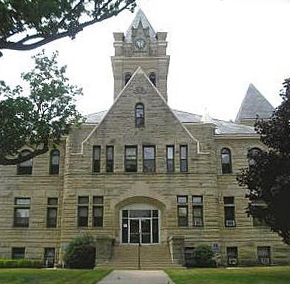 Employees in the Pulaski County Sheriff’s Office and Community Development Commission may soon be getting raises, as the county council tries to resolve issues with the county’s salary matrix. One problem has to do with Sheriff Jeff Richwine’s salary. He told council members Monday that state statute requires his salary to be at least half that of the county prosecutor, but it’s now below that threshold since the prosecutor got a raise last year.
Employees in the Pulaski County Sheriff’s Office and Community Development Commission may soon be getting raises, as the county council tries to resolve issues with the county’s salary matrix. One problem has to do with Sheriff Jeff Richwine’s salary. He told council members Monday that state statute requires his salary to be at least half that of the county prosecutor, but it’s now below that threshold since the prosecutor got a raise last year.
The challenge is that under the county’s salary matrix, each full-time employee gets paid a certain percentage of their department head’s salary. That means the county council can’t bring Richwine’s pay in line with state statute without either raising all Sheriff’s Office employees’ pay levels or changing the matrix.
Richwine felt his staff deserved a raise, but other county officials, including Auditor Laura Wheeler, felt it wouldn’t be fair to other departments. The sheriff took issue with that. “I don’t see any of them working holidays,” he said. “I don’t see any of them working midnights.”
“I beg your pardon. I do work about every holiday this last year,” Wheeler replied. “Now, I’m not saying that your people aren’t, but there are people who do work, and I don’t get time-and-a-half overtime. I don’t get any more money for it. I don’t get anything.”
“I’m waiting for you and for all the people that feel neglected in the courthouse to come apply,” Richwine responded. “We’ve got openings.”
There was also some confusion about how exactly the sheriff’s raise would trickle down to his employees. In the end, council members voted to bring Richwine’s salary up to state requirements. But they decided to hold off on any decisions about his employees’ pay, until they could research how the raises would impact the county’s budget.
In other salary business Monday, Community Development Commission Executive Director Nathan Origer said he and Project Coordinator Krysten Hinkle apparently weren’t given the one-percent pay raises that all other full-time county employees recently got. Council members pointed out that Origer didn’t specifically request an increase for his department. Others asked if a department should be excluded from an across-the-board wage, simply because they didn’t ask.
Council members eventually voted to amend the salary ordinance as needed, to fund the one-percent raises for the CDC. Council President Jay Sullivan noted that an additional appropriation may be needed.
Council member Ken Boswell said that while the salary matrix could be helpful, it suffers from an apparent lack of documentation. “We have a pay system, and nobody knows how it works,” he said. “So it’s very hard for Laura to implement it and all and mandate it out. It’s very hard for us, for me to tell you what we’re supposed to be giving. Was it supposed to be one percent across-the-board? To me, when we made the motion at the budget hearings, that’s the way it was made. Now, maybe it was meant to be handled differently in the past, but I don’t know that because I can’t see that. If you can’t hand me a piece of paper with it written on, to me, it’s error.”
Council member Alex Haschel expressed frustration that the salary matrix hasn’t helped reduce the number of requests for raises.

















